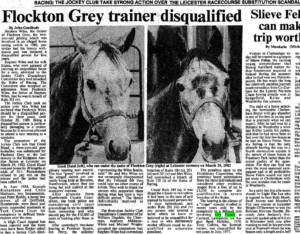 Flockton Grey was once described as the horse at the centre of one of the greatest racing scandals of twenty century but, notorious though his name became, the events that transpired at Leicester Racecourse on March 29, 1982, while scandalous, had nothing directly to do with Flockton Grey. True, a horse purporting to be Flockton Grey – a grey two-year-old gelding, bought cheaply as a yearling by businessman Ken Richardson, and saddled by unheralded trainer Stephen Wiles – won the Knighton Auction Stakes, over five furlongs, but the ease of his victory, coupled with strong marker support, led the Jockey Club to launch an investigation.
Flockton Grey was once described as the horse at the centre of one of the greatest racing scandals of twenty century but, notorious though his name became, the events that transpired at Leicester Racecourse on March 29, 1982, while scandalous, had nothing directly to do with Flockton Grey. True, a horse purporting to be Flockton Grey – a grey two-year-old gelding, bought cheaply as a yearling by businessman Ken Richardson, and saddled by unheralded trainer Stephen Wiles – won the Knighton Auction Stakes, over five furlongs, but the ease of his victory, coupled with strong marker support, led the Jockey Club to launch an investigation.
Ridden by former champion apprentice Kevin Darley, who was enduring one of several years in the wilderness, the debutant ‘Flockton Grey’ won by 20 lengths – an extraordinary distance by any standards, but less so once the full circumstances were revealed – at odds of 10/1, landing bets believed to be worth £200,000 in Yorkshire alone. Two days later, Racecourse Security Services visited Langley Holmes Stables in Flockton, West Yorkshire, where Wiles trained. They were shown a grey two-year-old gelding which, despite being a full-brother to Flockton Grey, was not the Leicester winner. The investigation continued at Jubilee Farm, a property owned by Richardson, in Hutton Cranswick in the East Riding of Yorkshire, but no trace of Flockton Grey could be found.
In any event, by chance, the racecourse photographer at Leicester had taken several stills of the winner, one of which clearly showed the horse with its mouth open. After a painstaking investigation, involving blown-up photographs and identity documents, the horse in question was identified not as the two-year-old Flockton Grey, but the three-year-old Good Hand, whom Richardson had owned as a two-year-old. Richardson denied all knowledge of Good Hand after the horse was taken away by Wiles, with a view to being sold, in 1981.
However, in May, 1984, Richardson and his two accomplices, Peter Boddy and Colin Mathison, stood trial at York Crown Court charged with conspiracy to defraud bookmakers. Still protesting his innocence, Richard appealed his guilty conviction, but his appeal was quashed in 1986 and, the same year, he was ‘warned off’ for 25 years by the Jockey Club. Richardson continued to petition the Home Secretary but, when the case was finally returned to the Court of Appeal in 1996, his appeal was dismissed again. At that time, Lord Justice Rose said that any conclusion other than that the Leicester winner was Good Hand ‘beggars belief’.